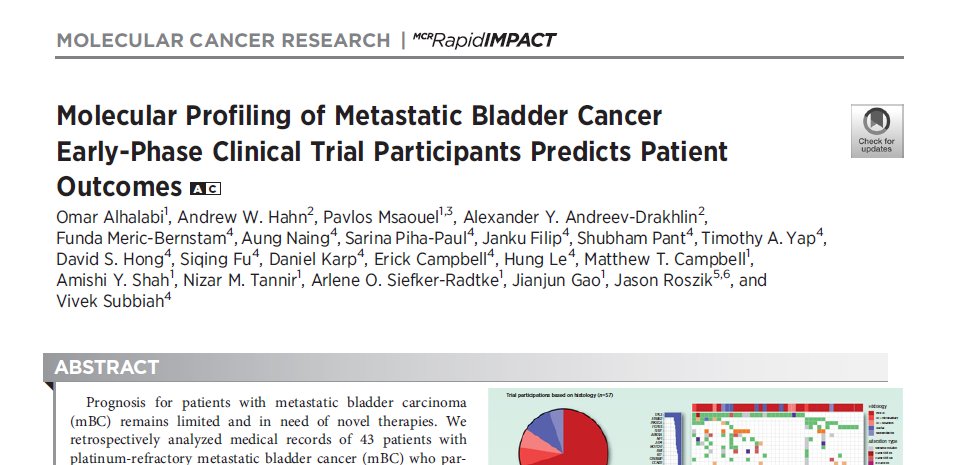1/6
 Molecular Profiling of Bladder Cancer Early-Phase Clinical Trial Participants Predicts Patient Outcomes published as Rapid impact paper @oalhalabimd et al
Molecular Profiling of Bladder Cancer Early-Phase Clinical Trial Participants Predicts Patient Outcomes published as Rapid impact paper @oalhalabimd et al
@MCR_AACR @AACR @CancerMedMDA #GU21 @ASCO @OncoAlert
#bcsm https://bit.ly/3d25A1U

 Molecular Profiling of Bladder Cancer Early-Phase Clinical Trial Participants Predicts Patient Outcomes published as Rapid impact paper @oalhalabimd et al
Molecular Profiling of Bladder Cancer Early-Phase Clinical Trial Participants Predicts Patient Outcomes published as Rapid impact paper @oalhalabimd et al @MCR_AACR @AACR @CancerMedMDA #GU21 @ASCO @OncoAlert
#bcsm https://bit.ly/3d25A1U
2/6 Prognosis for patients with metastatic bladder carcinoma (mBC) remains limited and in need of novel therapies @OncoAlert @MCR_AACR @oalhalabimd . #bcsm https://bit.ly/3d25A1U
3/6 Patients' tumors or circulating tumor DNA were analyzed by NGS. The median progression-free survival was 4.2 months, the median overall survival was 9.6 months, and the overall response rate was 17.5%. #GU21 @MCR_AACR @oalhalabimd #bcsm https://bit.ly/3d25A1U
4/6 TP53, ERBB2, PI3KCA, FGFR3, and ARID1A alterations were detected in 66%, 29%, 27%, 24%, and 22% of all patients, respectively. 64% of patients with an FGFR alt received an FGFR inhibitor, 67% of which achieved disease control. @ASCO #GU21 #bcsm https://bit.ly/3d25A1U
5/6 Among patients with urothelial carcinoma histology, those harboring a TP53 alteration had a shorter mPFS vs those who carry wild-type TP53. The reverse relationship was observed in patients harboring an FGFR alteration. #GU21 @MCR_AACR #bcsm https://bit.ly/3d25A1U
6/6 Implications: Patients with platinum-refractory mBC derive clinical benefit from participating in early-phase clinical trials and their survival outcomes correlate with the genetic profile of the tumor. #bcsm #GU21 @MCR_AACR https://bit.ly/3d25A1U

 Read on Twitter
Read on Twitter






